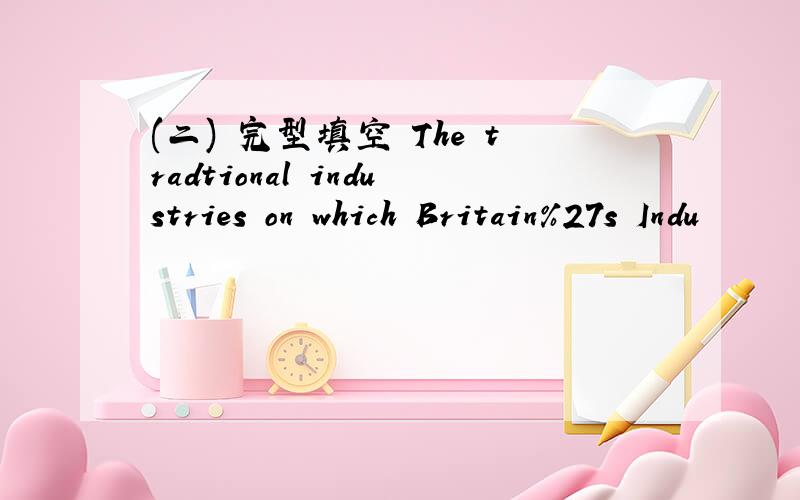(二) 完型填空 The tradtional industries on which Britain%27s Indu
来源:学生作业帮 编辑:大师作文网作业帮 分类:英语作业 时间:2024/11/13 16:40:12
(二) 完型填空
The tradtional industries on which Britain%27s Industrial Revolution was founded are declining.(选项1).a result of improved methods they are( 选项2) workers even faster than they are declining.(选项3) the last ten years (选项4) of people working in the textile industry has gone down by fourteen percent; in the shipbuilding industry down by fifteen percent; in minging and quarrying down by eighteen percent; in agriculture,(选项5) and fishing down by twenty-five percent.All these industries are based outside London,most of them in the north and Scotland.(选项6) The jobs which are increasing are those in engineering and light industry--up by 24%; jobs in finance,banking and insurance--up by 32%; jobs in (选项7)and wholesale trade-- up by 34% ;andjobs in professional and business services --up by 43%.Yet fobs of this kind tend for many reasons to be(选项8) concentrated in and around London.They are not tied to the (选项9)of raw materials (选项10)is mining; they are free (选项11) various historical factors that (选项12) some industries; there is a natural tendency for head offices to be sited in the capital city; and as the (选项13) of commerce and business becomes ever more international,it is important or (选项14)people to be near an international airport.Indeed,England has always been centralised (选项15) a quite extraordianary degree.London is still four times (选项16) the next biggest city in Britain; its port is the third biggest in the world; the City of London is the financial capital,not merely of Britain(选项17) of the whole sterling area; it is the seat of government and administration,and so (选项18) there is no regional government,central government remains enormous.The centripepal force of this metropolis is (选项19),and it tends to suck the talent,and(选项20) the lifehood,from the rest of the country.
(1) (A)With (B)For (C)As (D)Since
(2) (A)sharing (B)shedding (C)shaping (D)shaving
(3) (A)In (B)For (C)After (D)Since
(4) (A)a number (B)the number (C)a amount (D)the amount
(5) (A)forests (B)forest (C)forestry (D)woods
(6) (A)by contrast (B)in contrast (C)by order (D)in order
(7) (A)entail (B)retail (C)detail (D)retail
(8) (A)accidentally (B)heavily (C)separately (D)steadily
(9) (A)cause (B)source (C)course (D)core
(10) (A)that (B)which (C)as (D)where
(11) (A)of (B)away from (C)to (D)for
(12) (A)effort (B)affect (C)effect (D)infect
(13) (A)portion (B)measurement (C)volume (D)scale
(14) (A)more or less (B)more and more (C)less (D)fewer
(15) (A)to (B)for (C)on (D)with
(16) (A)not bigger than (B)so big as (C)as big as (D)bigger as
(17) (A)and (B)so (C)but (D)then
(18) (A)as soon as (B)as long as (C)provided that (D)supposing
(19) (A)colossal (B)glorious (C)triumphant (D)manifold
(20) (A)anyhow (B)hence (C)nevertheless (D)somehow
The tradtional industries on which Britain%27s Industrial Revolution was founded are declining.(选项1).a result of improved methods they are( 选项2) workers even faster than they are declining.(选项3) the last ten years (选项4) of people working in the textile industry has gone down by fourteen percent; in the shipbuilding industry down by fifteen percent; in minging and quarrying down by eighteen percent; in agriculture,(选项5) and fishing down by twenty-five percent.All these industries are based outside London,most of them in the north and Scotland.(选项6) The jobs which are increasing are those in engineering and light industry--up by 24%; jobs in finance,banking and insurance--up by 32%; jobs in (选项7)and wholesale trade-- up by 34% ;andjobs in professional and business services --up by 43%.Yet fobs of this kind tend for many reasons to be(选项8) concentrated in and around London.They are not tied to the (选项9)of raw materials (选项10)is mining; they are free (选项11) various historical factors that (选项12) some industries; there is a natural tendency for head offices to be sited in the capital city; and as the (选项13) of commerce and business becomes ever more international,it is important or (选项14)people to be near an international airport.Indeed,England has always been centralised (选项15) a quite extraordianary degree.London is still four times (选项16) the next biggest city in Britain; its port is the third biggest in the world; the City of London is the financial capital,not merely of Britain(选项17) of the whole sterling area; it is the seat of government and administration,and so (选项18) there is no regional government,central government remains enormous.The centripepal force of this metropolis is (选项19),and it tends to suck the talent,and(选项20) the lifehood,from the rest of the country.
(1) (A)With (B)For (C)As (D)Since
(2) (A)sharing (B)shedding (C)shaping (D)shaving
(3) (A)In (B)For (C)After (D)Since
(4) (A)a number (B)the number (C)a amount (D)the amount
(5) (A)forests (B)forest (C)forestry (D)woods
(6) (A)by contrast (B)in contrast (C)by order (D)in order
(7) (A)entail (B)retail (C)detail (D)retail
(8) (A)accidentally (B)heavily (C)separately (D)steadily
(9) (A)cause (B)source (C)course (D)core
(10) (A)that (B)which (C)as (D)where
(11) (A)of (B)away from (C)to (D)for
(12) (A)effort (B)affect (C)effect (D)infect
(13) (A)portion (B)measurement (C)volume (D)scale
(14) (A)more or less (B)more and more (C)less (D)fewer
(15) (A)to (B)for (C)on (D)with
(16) (A)not bigger than (B)so big as (C)as big as (D)bigger as
(17) (A)and (B)so (C)but (D)then
(18) (A)as soon as (B)as long as (C)provided that (D)supposing
(19) (A)colossal (B)glorious (C)triumphant (D)manifold
(20) (A)anyhow (B)hence (C)nevertheless (D)somehow

1.c 2.b 3.a 4.b 5.c 6.b 7.b/d 8.d 9.b 10.c 11.a 12.b 13.b(?) 14.b 15.a
16.d(?) 17.c 18.c 19.a 20.
16.d(?) 17.c 18.c 19.a 20.
(二) 完型填空 The tradtional industries on which Britain%27s Indu
英语翻译To ride on the fast development of China’s aviation indu
英语完形填空,sixty percent of britain's food bill is spent on pet
初二英语完形填空The United States,Great Britain took the war on Irap
关于英语完形填空Mother’s Day is celebrated in both Britain 1 the USA
7A 完形填空Mother’s Day is celebrated in both Britain 1 the USA.
英语翻译The expansion of the chemical process industries on the
关于英语的完形填空Mother’s Day is celebrated in both Britain 1 the US
It's a commom____________to drive on the left in Britain.A.s
As one of the world’s oldest industries
Britain is the only country to compete with the US on this s
Do you know when Britain _______ war on Germany during the S